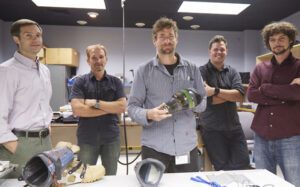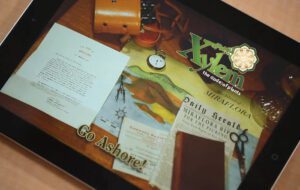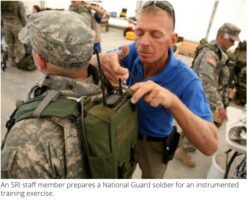Press
-

How Do We Keep Students Engaged in Learning Science?
Children come to school with curiosity and questions about their world. As educators, we need to keep children curious and excited throughout their schooling—encouraging them to explore their environment, ask questions, make predictions about what they think will happen and why, and test those predictions. Toward this end, states have collaborated to develop a completely…
-

Community Colleges Provide Invaluable Stepping Stone for Autistic Youth
Community colleges may provide a smoother transition to the academic and social challenges that can arise in a university setting. These institutions may be particularly appealing for students with autism spectrum disorders (ASDs) to pursue postsecondary education while still remaining at home, where they have the continuity of family support and a consistent environment. To…
-

Leading the Conversation on the Future of Robotics
Lately it seems that robotics is at the forefront of many conversations—about technology, jobs, startups, education, and more. At SRI, we’re gearing up for National Robotics Week in April and partnering with Xconomy to bring together some of the industry’s foremost thought leaders on April 10 at Robo Madness 2014. And, we’ll be sharing our passion for robotics…
-

Iris Recognition Improves Access Control without Slowing Down Business
If your office building or facility is like most, people come and go throughout the day. Employees and visitors need quick access to get their jobs done, and your business needs security. So what is the best approach to ensuring secure access without slowing things down? Most organizations use a variety of traditional methods to…
-

Incorporating Digital Learning Resources in the Classroom: A First Look at Using Khan Academy
Today’s teachers are using online learning resources and blending digital learning with traditional teacher-led instruction. But it’s challenging to identify high-quality resources and determine how they will work best in classrooms, given particular instructional priorities and the characteristics of the students being served. As a leading digital learning organization in K-12 education, Khan Academy has…
-

ARPA-E and SRI’s Energy Innovation Pipeline
In winter 2012, SRI International began building a proof-of-concept system to demonstrate natural gas storage at low pressure in a conformable tank. We featured the technology, funded under the Advanced Research Projects Agency—Energy (ARPA-E) Methane Opportunities for Vehicular Energy (MOVE) program, at ARPA-E’s 2013 Energy Innovation Summit.We returned to the 2014 Summit this week to…
-

Groundbreaking FASTcell Testing Service Quickly and Accurately Detects and Characterizes Circulating Tumor Cells
For years, there has been a major unmet need for a more sensitive method for improved identification and characterization of rare circulating tumor cells (CTCs), blood markers that can identify tumors that are metastasizing and spreading. To address this crucial need, SRI Biosciences acquired scanning instrumentation technology from PARC, a Xerox company, that we are developing into…
-

Gaming for a Higher Purpose: Crowdsourcing to Find Vulnerabilities in Mission-critical Software
More and more, people around the world rely on complex software systems in all areas of life—from transportation to utility grids to medical equipment. We depend on these software systems to be secure and reliable. Yet today, the way to assure bug-free software code is through formal software verification, which requires highly specialized computer scientists…
-

Positive Results When Preschoolers Use Media-Rich Math Curriculum Supplement
SRI Education and Education Development Center (EDC) recently released findings from our large experimental field study of a PBS KIDS mathematics curriculum supplement. The PBS curriculum supplement features use of “transmedia”—with familiar characters, settings and stories appearing across different platforms, such as video and interactive games. The study’s findings can inform the conversations that parents, teachers, policy…
-

Wellness Tourism is a Growth Opportunity Worldwide
Ask individuals how healthy they feel when traveling, and you’re more likely to hear a litany of complaints than a list of benefits. Even when we take a vacation to unwind, jet lag, missing sleep, unhealthy meals, and disrupted exercise routines are side effects of the way we travel, whether for business or for pleasure.…
-

Veterans’ Experience is Valuable to SRI International and the Clients We Serve
As a veteran of the Vietnam War and a graduate of West Point, Veterans Day touches me personally and professionally. It’s vitally important that as a nation we have a day that recognizes those who are serving—and those who have served—in the United States Armed Forces. It brings both a sense of history and purpose…
-

Reaching Populations Faster in Emergency Management of Disasters – Oral Drugs as Antidotes to Radiation Exposure
Without warning, a major earthquake and subsequent tsunami hit Japan in March 2011. Damage was significant at almost every level, impacting people and the environment. Shortly thereafter, a core meltdown at the Fukushima Daiichi nuclear plant—the largest nuclear event since the Chernobyl disaster in 1986—intensified the situation. Almost immediately concern arose about the many health…